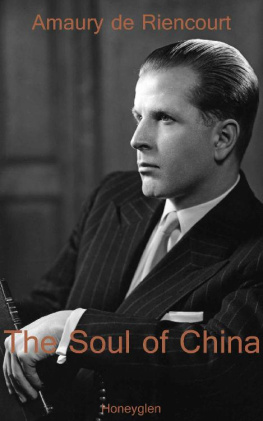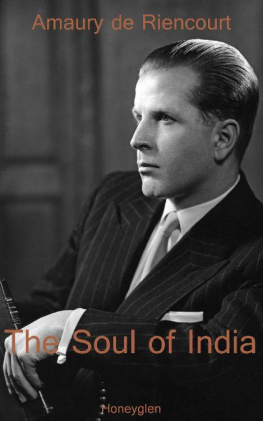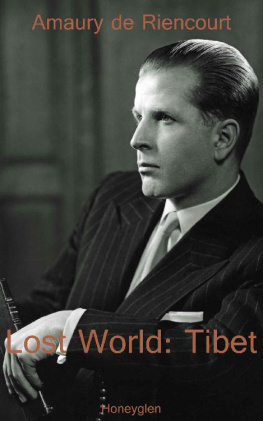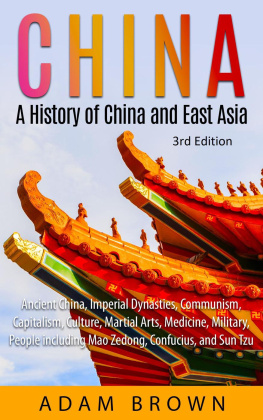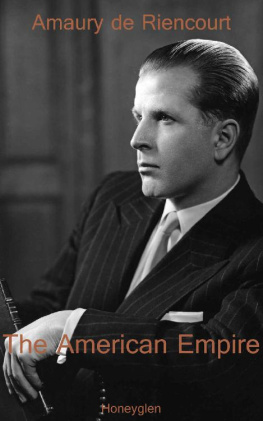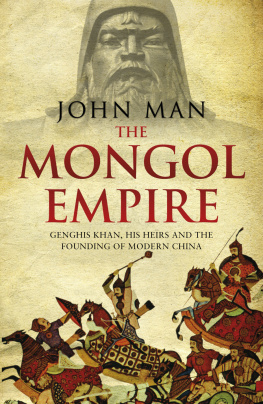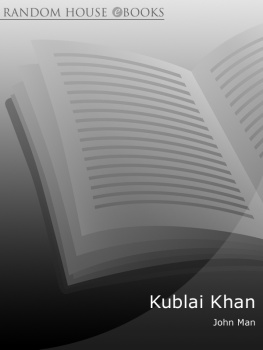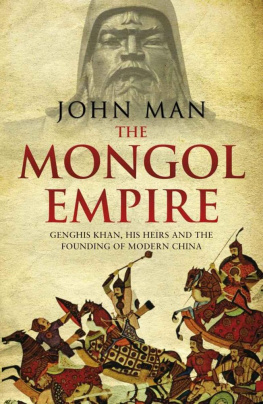THE SOUL OF CHINA
By the same author
LOST WORLD: TIBET
THE COMING CAESARS
THE SOUL OF INDIA
THE AMERICAN EMPIRE
WOMAN AND POWER IN HISTORY
THE EYE OF SHIVA
A CHILD OF THE CENTURY
AMAURY de RIENCOURT
THE SOUL OF CHINA
Honeyglen Publishing Limited
digital@honeyglenpub.co.uk
Copyright Amaury de Riencourt 1958
All rights reserved. No part of this publication may be reproduced, stored in a retrieval system, or transmitted, in any form or by any means, electronic, mechanical, photocopying, recording or otherwise, without the prior permission of the copyright owner.
First published in the U.S. by Coward-McCann in 1958
First published in the U.K. by Cape in 1959
Revised edition by Harper Colophon Books in 1965
Present revised and updated edition published in the U.K. by Honeyglen in 1989
British Library Cataloguing in Publication Data
Riencourt, Amaury de
The Soul of China
ISBN 978-0-907855-20-0 MOBI (Amazon Kindle,)
ISBN 978-0-907855-21-7 EPUB (Apple iBook,)
CONTENTS
FOREWORD TO THE SECOND REVISED EDITION
The main body of this work was written over thirty years ago. This revised and updated edition brings the analysis of Chinas historical evolution up to the year 1989, some thirteen years after Maos death.
Up to and including chapter 15, the ancient WadeGiles Romanization has been preserved. In chapter 16 and in the Epilogue, the text switches to the new Pinyin transliteration, with the WadeGiles system preserved in brackets. The Pinyin transliteration became official in the Chinese Peoples Republic on January 1, 1979coinciding with, but unrelated to, the official normalization of diplomatic relations with the United States of America. The Pinyin system is presumed to make it easier for foreigners to use the Peking dialect pronunciation. Whether or not this is the case, it is a fact that in some instances different neighboring provinces such as Shensi and Shansi (WadeGiles) are now rendered Shanxi and Shaanxi in Pinyinhardly an improvement. For the foreseeable future, it is likely that both systems will remain in use.
This parallels the effort made, starting in June 1950, by the Chinese Ministry of Educations Committee on Language Reform to simplify Chinese characters themselves, in order to promote the wider literacy of the population of China. Simplified forms, in use for over thirty years, are now widely accepted in mainland China. It must, however, be kept in mind that the older, more complex, characters are still in use in Hong Kong and Taiwan; and so is the WadeGiles transliteration.
July 1989
INTRODUCTION
Few people would argue today that the fate of China is not of primary importance to the world. What might seem to be quaint traditions and colorful oddities in small communities becomes a formidable fact when shared by more than six hundred million human beings. Revolutions can become major catastrophes of history when they overturn such immense masses as the Chinese people.
The history of China during the past half-century has been tragic for the Chinese and for their Western friends alike. A great many Western people who knew China well have been appalled by this hopeless unfolding of events, anguished by the endless tale of pathetic misunderstandings which perpetually garbled the relations between China and the West, and puzzled by seemingly irrational reactions on the part of Far Eastern friends of long standing. A great many more Westerners had fallen in love with China than ever did with Japan, India or the Arab world. The Chinese, the supreme humanists of all times, seemed closer to us than any other Asian people; their delicate civilization was utterly entrancing to the more discriminating type of Westerner. Their refined courtesy, their subtle humor, their profound art, their exquisite food, everything conspired to make of China the second homeland of most Europeans and Americans who had ever been to the Celestial Land.
And, suddenly, this fantastic revolution, this bold plunge into an inhuman form of totalitarianism, this sudden disclosure of an almost pathological hatred for the West! It seems utterly incomprehensible. Yet it is not through lack of authoritative books and comprehensive studies that the West has sinned. Centuries ago, Europe became fascinated by the remote Celestial Empire and all those who care to do so can still find on some dusty shelf a copy of a work entitled Confucius, Sinarum Philosophus, sive Scientia Sinensis, published in Paris in 1687. This remarkably thorough work was written by Jesuits who had spent a great part of their lives in China, and who had become thoroughly Chinese indeed. Every cultured European in the eighteenth century read this work and the countless works which followed on its heels. Such profound minds as Leibnitz and Voltaire were deeply influenced by Chinese thought. And generation after generation of Westerners studied Chinese affairs, then traveled to the Far East and became immersed in an immemorial China without noticing that, somehow, they had never really penetrated into the innermost recesses of the Chinese soul, had never grasped the essence of the Chinese mind.
There was, from the start, something wrong in the intellectual approach of the Westerners. Caught in the tight web of their own specific problems, trapped by their own intellectual snares, imprisoned within the narrow vista of their peculiar world outlook, the Westerners saw of China only what they wanted to see. Quite unconsciously, they looked at China in a subjective way and inevitably made two fundamental and related mistakes: on the one hand, they were unwilling to look for a comprehensive philosophy of history which might determine the great similarities existing between the historical evolutions of China and the Westand of all other civilizations, for that matter. They were thus unable to determine at what stage of their evolutions both China and the West had arrived. Yet it was obvious that a China that was old when Julius Caesar crossed the Rubicon had already gone through the same stages of cultural development through which the modern West was proceeding two thousand years later, and in the same sequence. Thus, one aspect of the Chinese problem which Westerners chose to ignore was the point of intersection at which both China and the West, following their separate historical courses, were meeting. And then, on the other hand, they refused to see the unique, original and utterly incomparable features of Chinese civilization. Westerners, basically, saw only in the Chinese men like themselves, a little wiser, a little weaker, a little more mellow. Those of definite religious bent saw in the Chinese a wonderful raw material for conversion to Christianity; others, on the contrary, saw in them skeptics who had been able to do without theological notions, men who were a living proof that morality and lack of religion were perfectly compatible. Nowhere was there an attempt to look at China from both angles at once, to see objectively that Chinese history conformed to a definite pattern of history but that, at the same time, Chinese civilization had a unique personality of its own and would one day refuse to bow to a Western civilization that was wholly alien to it. Westerners looked upon China as Herodotus had once looked upon a petrified Pharaonic Egyptbaffled, awed and totally unconscious of their respective positions in the development of history.
From this initial misconception sprang all the others. A great myth arose among Westerners watching the ocean-like uniformity of a static Chinese civilization which never seemed to be stirred by the slightest breeze, whereas dynamic Europe was in the throes of perpetual convulsionsthe myth of the timeless East, a motionless giant who was forever condemned to follow clumsily in the wake of Western progress. What the West failed to understand was that China had long since passed the point at which Western Europe was arriving in the nineteenth and twentieth centuries.
Next page
